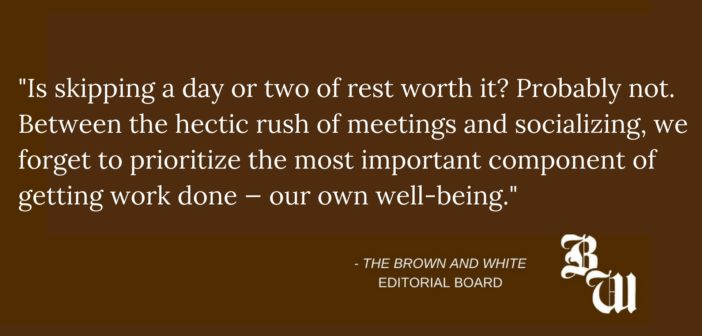Something in the air seems different.
Different for some, at least. Others feel wary of the invisible storm on the horizon.
They know it’s coming. They just don’t know when.
It starts off innocent enough: a dry cough near the back of the classroom. Someone in the front row takes the cue and joins in, then another, then 10 more. A chorus of raspy voices becomes the norm for the next hour.
The freshman plague has returned, and there’s nowhere to run.
Getting sick at school is inevitable. Sticking 30-plus people in cramped dorms guarantees that some kind of illness will spread, consuming study groups and student organizations alike.
Assessing your own health is in the fine print of the college experience. Students learn — and are quickly reminded of — how to take care of themselves in the first few months of the semester.
It’s almost impossible to avoid the zombification of the student body. Sick roommates, late nights of catching up on Netflix and sucking face with little regard for the consequences creates a cocktail of potential sickness waiting to be spread around campus.
Still, we persist.
“Just don’t think about itchy throats,” you say to yourself while making dinner with your sniffling roommate.
“Tonight is my night,” you say through a sudden sneeze. “Literally nothing will stop me from going out.”
You party the weekend away with a hundred others in spaces smaller than the dorms where the plague originated. The initial encounter with your sick classmate seems like years ago.
You feel invincible.
The next morning is a daze, somewhere between half-dead and hungover. When day turns to night, you realize something dreadful — this isn’t going away any time soon.
A fever you can’t sweat out? Check.
Nauseous from the thought of walking up the hill? Get used to it.
The next week becomes a personal hell. Finishing a single assignment feels like an entire day’s worth of effort. Pounding headaches accompany every cup of coffee needed to survive through classes.
Don’t even think about complaining to the health center without a game plan. Nurses in high schools who gave out cough drops and mints were at least consistent in how they treated you.
Is skipping a day or two of rest worth it? Probably not.
Between the hectic rush of meetings and socializing, we forget to prioritize the most important component of getting work done — our own well-being.
When people feel like they can fight the plague through sheer willpower, they create a vicious cycle, both for themselves and others.
Without rest and recuperation, every day becomes a fight to stay awake. Traveling to class feels like sprinting a marathon to win a participation trophy. As soon as you get there, it doesn’t seem worth it.
Learning to take care of yourself involves being able to tell when enough is enough. Days ago you looked at the person hacking in the front row with disdain, wondering why they didn’t stay home to keep everyone else safe.
Today, you’re the one getting the glares.
The semester isn’t going to get any easier from here. Fill breaks in the day with sleep rather than coffee. Fill nights with rest rather than regrets.
The plague might become your life for a bit, but that’s OK.
Just make sure you survive to see the end of it.






Comment policy
Comments posted to The Brown and White website are reviewed by a moderator before being approved. Incendiary speech or harassing language, including comments targeted at individuals, may be deemed unacceptable and not published. Spam and other soliciting will also be declined.
The Brown and White also reserves the right to not publish entirely anonymous comments.